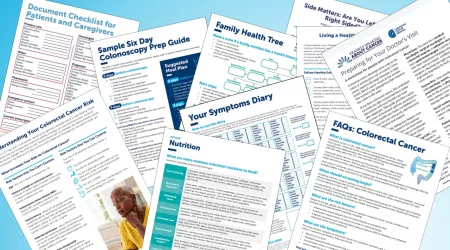Colorectal Cancer Alliance Shines Light on Why Young Individuals Are Being Misdiagnosed
The Faces of the Misdiagnosed
March is National Colorectal Cancer Awareness Month
Colorectal Cancer Alliance Shines Light on Why Young Individuals Are Being Misdiagnosed
Washington, D.C. (March 1, 2018) – Doctors told Tawny Mack, now 31, that she probably had hemorrhoids. Stephen Estrada, then 28, was twice misdiagnosed with constipation. Tracy Gaither, 42, was told she had parasites. Fawn McAdie at age 28 was told that she was working out too hard. In the end, they were all diagnosed with colorectal cancer.
“I knew that something wasn’t right,” Gaither said. “And I just kept pushing my doctor until he said, ‘You need a colonoscopy.’ People have to advocate for themselves.”
To help raise awareness about young individuals being misdiagnosed as part of National Colorectal Cancer Awareness Month, national non-profit the Colorectal Cancer Alliance recently conducted a survey of individuals under the age of 50 who were diagnosed with colorectal cancer.
Results showed a population of survivors who often faced barriers to screening due to their age, were most often misdiagnosed at the start of their journey, and then received a diagnosis of late-stage colorectal cancer—a disease that is highly treatable if caught early.
Out of the 1,600 young onset colorectal cancer survivors (under age 49) from around the world who took the survey, the results revealed that:
- 82% of individuals were initially misdiagnosed
- 73% were diagnosed at a later stage
- 50% felt their symptoms were ignored
- 62% did not have family history
- 67% saw at least two doctors before diagnosed
“Each and every day we meet men and women across this country that are diagnosed with colorectal cancer at way too young an age,” said Michael Sapienza, CEO of the Colorectal Cancer Alliance. “The Colorectal Cancer Alliance is dedicated to finding out why this is happening and moving towards action of raising awareness for screening, and funding research to end this within our lifetime.”
Young Onset Statistics & Warning Signs. Colorectal Cancer doesn’t care about age and doesn’t just strike the older population. Currently, one in 10 individuals under the age of 50 are being diagnosed with colorectal cancer. According to the American Cancer Society, the incidence rate in people younger than 50 is increasing, from 6% of individuals younger than 50 in 1990 to 11% in 2013. By the time of correct diagnosis, in many occasions, the cancer has progressed to the advance stages. The Colorectal Cancer Alliance has committed $1 million to young onset research in 2018 and continues to educate about early detection, establishing an open dialog with physicians to achieve correct diagnosis and screening options.
Warning signs of colorectal cancer includes:
- Anemia
- Rectal bleeding, dark or black stool
- Change in bowel habits
- Diarrhea and/or constipation
- Narrowing of stool
- Abdominal discomfort (cramps, gas, pain, bloated)
- Unexplained weight loss
- Weakness/fatigue
- Nausea or vomiting
Colorectal cancer is the second leading cause of cancer related death in the United States. This year, it is estimated that more than 135,000 Americans will be diagnosed with colorectal cancer, and nearly 50,000 will die from the disease. In its early stages, colorectal cancer is highly treatable, with a five-year survival rate of 90%, making it a stoppable and preventable disease through early detection. It is estimated that 1.7 million new cases are expected in 2018 according to the American Cancer Society.
The Colorectal Cancer Alliance’s mission is to end colorectal cancer within our lifetime through providing support services, awareness of preventive measures, and funding critical research. The nonprofit is hosting several events and initiatives during the March awareness month:
National Dress in Blue Day (March 2) - The Colorectal Cancer Alliance first launched the National Dress in Blue Day program in 2009 to bring national attention to colon cancer and to celebrate the courage of those affected by this disease. Today, individuals, businesses and community groups across the country participate in National Dress in Blue Day by wearing blue and encouraging others to do the same.
Undy RunWalk and ScopeItOut 5K - Throughout the year, the organization hosts over 20 fundraising run/walk events in major cities throughout the United States, with the largest race in the series taking place in the Nation’s Capital this month on March 18th.
Nationwide Colonoscopies - Honoring their vision of a world free of colorectal cancer within our lifetime, the Alliance will schedule and cover 50 colonoscopies nationwide to individuals across the country.
Every Ally is a Hero - During the month of March, the Colorectal Cancer Alliance will launch its “Every Ally is a Hero” campaign - highlighting 31 allies (one ally each day) of those who have been diagnosed with colorectal cancer from across the United States. Profiles of the survivors, patients and/or caregivers personal stories and journey will be featured on ccalliance.org and on The Alliance’s social media.
About the Colorectal Cancer Alliance
The Colorectal Cancer Alliance is a national nonprofit committed to ending colorectal cancer. Working with our nation of passionate allies, we diligently support the needs of patients and families, caregivers, and survivors, eagerly raise awareness of preventive screening, and continually strive to fund critical research. As allies in the struggle, we are fiercely determined to end colorectal cancer within our lifetime.
About Dress In Blue Day
Dress in Blue Day began with Anita Mitchell. Ms. Mitchell was battling stage IV colon cancer and had lost a close friend and father to the disease. She saw a need to bring greater awareness to a cancer not many people wanted to discuss. Ms. Mitchell is a founder of Colon Cancer STARS and a volunteer for the Colorectal Cancer Alliance. She brought the Dress in Blue concept to the Colorectal Cancer Alliance in 2009. The Colorectal Cancer Alliance expanded this concept into Dress in Blue Day, a national celebratory day to raise awareness of colorectal cancer, specifically highlighting the spirit and courage of survivors and their families, and honoring the memory of those lost to the disease. Today, individuals, businesses and community groups across the country participate in National Dress in Blue Day by wearing blue, raising funds and motivating others to do the same, all in the name of awareness.
Top resources

FDA approves ColoSense, mt-sRNA screening test from Geneoscopy
ColoSense is a screening test for adults, 45 years of age or older, who are at average risk for developing colorectal cancer (CRC).

Legislation introduced to address young-onset CRC
Explore the urgent need for the Colorectal Cancer Early Detection Act (HR 7714), legislation aimed at combating the rising incidence of colorectal cancer among younger adults through enhanced screening, education, and research.

Colorectal cancer resources for learning and sharing
Whether personally impacted by colorectal cancer (CRC), supporting a loved one, or dedicated to educating and empowering others, these downloadable and printable resources can help.





